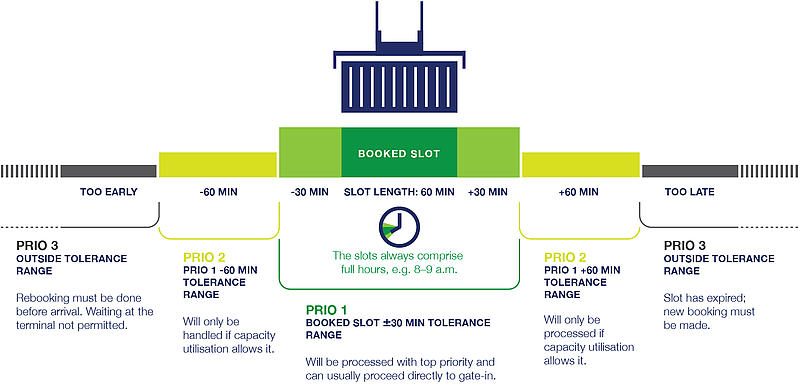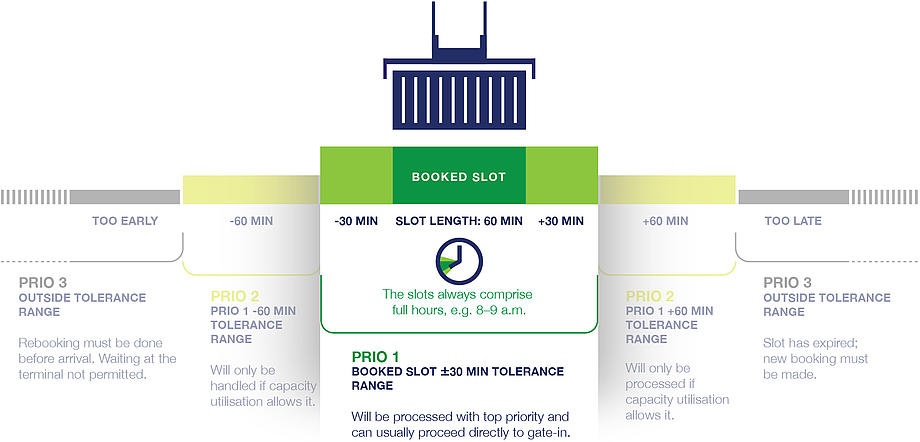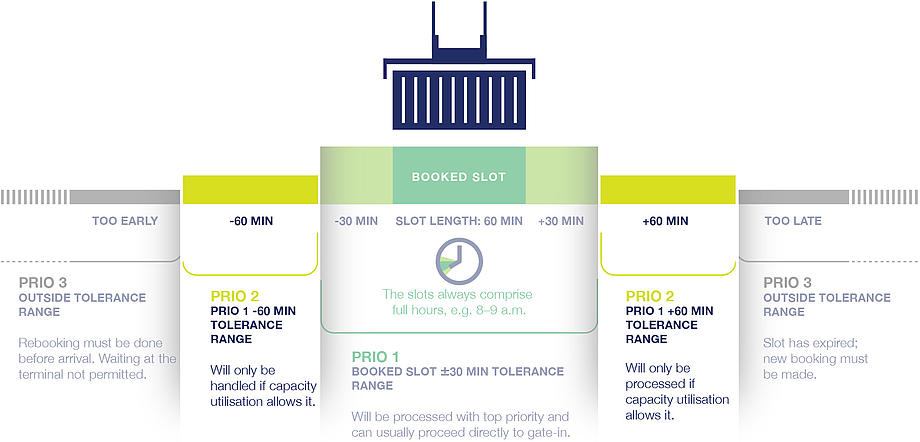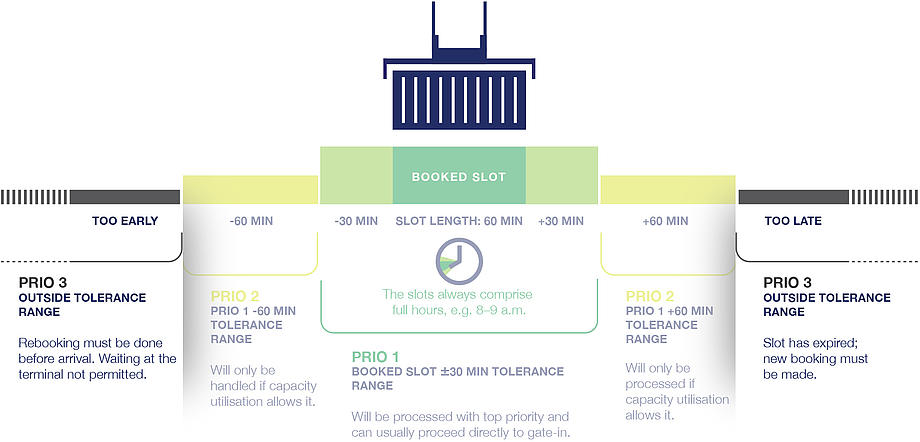Slot bookings for truck visits at HHLA's Hamburg terminals
The slot-booking process (SBV) for trucks in the Port of Hamburg is designed to reduce bottlenecks and improve traffic flow. With the help of the SBV, heavy goods vehicle deliveries and the capacity of the terminals are efficiently coordinated.
A slot booking is required for all container transports with mandatory pre-announcement. Containers arriving without a valid booking cannot be processed. If capacity is available at the desired time, the slot for the heavy goods vehicle to arrive can be booked. Otherwise, the system displays the next available time window. The current capacity utilisation of the terminals can be viewed at any time at slot.truckgate.de.

When a truck arrives, the current time is compared with the booked slot. If the vehicle arrives on time within the 60-minute slot (+/- 30-minute tolerance), it is processed as planned. If the agreed time window cannot be adhered to, the slot must be cancelled before arrival. Otherwise, handling cannot be guaranteed and is only possible within the extended tolerance period (+/– a further 60 minutes), provided that capacity utilisation allows it (priority 2, see graphic). If there is a significant time deviation (priority 3, see graphic), cancellation and rebooking of the slot is mandatory.
Please note: It is not possible to book a slot on the terminal site. Waiting in the terminal car park is also not permitted.
For smooth handling, please observe the following principles
- Demand-oriented booking: Only book the actual container quantities that you need for the day in question, in order to make efficient use of handling capacity.
- Binding planning: Only book slots when the transport is definitely planned.
- Early booking: If possible, book four hours in advance. This increases the chance of an available time slot.
- Avoiding cancellations: Use all booked slots and avoid cancellations, especially after the start or expiry of the booked time slot.
- Timely cancellation: If you need to cancel, do so as early as possible – ideally several hours in advance – to free up the slot for other participants.
By adhering to these principles, you actively contribute to efficient operations at the HHLA container terminals and support fair and smooth handling for all parties involved.
General informationen
1. What are slots?
A terminal’s available resources for truck handling determine how many containers can be handled within the space of one hour. On the basis of this it is then determined how many slots can be provided. These slots are available for truck visit bookings within a one-hour time window. Time windows begin every hour, on the hour. One slot relates to one container.
2. What does the slot-booking process have to do with pre-announcement and TR02?
The basis for the slot-booking system is the mandatory pre-announcement of truck visit data via the TR02 data interface, which was introduced in November 2016. Haulage companies or truck drivers must pre-announce a truck visit, providing the time and date of their planned arrival at the terminal A slot is booked based on this information.
3. Why do all containers from a truck visit need to be combined into one pre-announcement?
- The OCR gate is a bottleneck and thus only permits the input of one pre-announcement number (PAN). Several pre-announcements would increase the risk of bottlenecks.
- The slot is validated at the OCR gate. Each booked slot is linked to a pre-announcement (PA), which is why it would not be possible to perform an unambiguous check in case of different PA.
- The driver receives their driving instructions at the OCR gate on the basis of the PA (e.g.: drive to the check gate). This routing can only work if all containers are pre-announced in one PA.
4. For which visits it is necessary to book slots?
Slots must be booked for all container transport subject to mandatory pre-announcement. A valid appointment is needed before processing can be carried out at the terminal.
5. Is slot booking free of charge?
Yes, there is no charge either to register for or to participate in pre-announcement, and the terminals will not charge any fee for slot booking. A free web application (TruckGateApp) is also available.
6. Can I book a slot in advance?
Slots can be booked up to three working days in advance. Early booking ensures the availability of the desired appointment.
7. How long is the time window per slot?
The slot which the haulage company can book is for a one-hour time window. Time windows begin every hour, on the hour. In addition, each booked slot has a 30-minute tolerance before and after the booked time slot, so the total time allowed for arrival is two hours.
If the check-in takes place with Priority 2, another one hour of tolerance will be added before and after the booked time slot, effectively allowing four hours for arrival.
8. Is it necessary to book a slot at any time of the day or night?
The obligation to pre-book a slot applies at all times during the hours of operation of the HHLA terminals.
9. Is it possible to change slots which have already been booked?
Yes, the following options are available for this:
Adding to bookings
It is possible to add containers to an existing pre-announcement. However, the pre-announcement and the status request of the container to be added must be marked “executable”.
Cancelling Slots
Slots can be cancelled at short notice. This gives the terminal the best possible overview of the actual number of expected trucks within a slot.
Out of consideration for other market participants, a cancellation should take place in a timely fashion.
10. What are no-shows and what consequences do they have?
All cancellations and unused slots are counted as no-shows. A no-show quota is calculated for each participant at the SBC. This quota counts how many slots are booked but not used. If a company repeatedly overbooks slots, temporary measures will be taken.
How is the no-show rate calculated?
- The no-show rate indicates the proportion of unused slots. Such ‘no-shows’ are set in relation to the total number of booked containers. Every cancellation and every slot expiry generates a no-show.
Measures:
- The data is transparently available to everyone on the TruckGate web portal.
- If the no-show rate in a calendar week is too high, the haulage company will only have a limited number (quota) of bookable slots at rush hour (06:00-17:59) available in the following week.
- Bookings at off-peak times (18:00-05:59) are still possible.
- Rebooking and exchanging slots is no longer possible.
11. How long are booked slots valid for?
Slot bookings will become invalid once the handling time window associated with a specific slot has expired. Depending on the defined priority, this will be the case, at the latest, once the leeway period for Priority 2 has ended. Unused pre-announcements are cancelled automatically by the terminal after twelve hours.
12. Is it possible to view the level of capacity utilisation for the time windows?
The various terminals’ current level of capacity utilisation can be viewed at slot.truckgate.de.
You can also use an interface to import a terminal’s current capacity utilisation status into your own scheduling system. Information about this can be found at www.truckgate.de.
13. How are the slots assigned?
Slots are assigned according to the time of registration. If capacities are still available at the requested time, the slot can be booked for the truck visit.
14. What should I do if no more slots are available at the requested time?
If there are no more slots available at the requested time, a different time window must be selected. The system automatically offers the next available time window before and after the desired time window as an alternative.
Off-peak times, especially the evening hours, are particularly well-suited to transport movements, as terminal utilisation is significantly lower at these times. This means that you can book a slot more easily and be handled faster.
The various terminals’ level of capacity utilisation can be viewed at slot.truckgate.de.
15. Which truck visits are not covered by the slot-booking process?
Slots must be booked for all container transport subject to mandatory pre-announcement. The sole exception applies for special cases which cannot currently be pre-announced. In these cases, the driver may register via the manual pre-check (MPC) and the truck will be processed there without a pre-announcement number (PAN).
16. What effects does the SBP have on handling?
A slot must be booked for truck handling. Handling without a slot is only possible in the stated exceptional cases. Truck visits and terminal capacity are synchronised. This helps to avoid bottlenecks and makes planning easier for all parties.
17. What are special slots / special slot classes?
Some truck visits are assigned Priority 1 irrespective of their punctuality. The transport movements, which are to be registered via TR02, are as follows:
- Delivery of IMO containers with dangerous goods categories 1.1, 1.2 and 7 (special slot class IMOANM)
- Delivery of late arrivals that the shipping company has notified the terminal about (special slot class LATE)
- Delivery and receipt of containers in the event of a ship being repositioned (special slot class SHIP)
Special slot classes are set up by the terminals as and when necessary and can only be booked by haulage companies once the terminals have given them the go-ahead. For dangerous goods containers of the above classes, the haulage company is already in contact with the terminal and can register the need. In other cases, communication takes place via the ship owner or directly with HHLA, if they are responsible for the repositioning of the ship.
As soon as the special slot class has been set up and released for the haulage company, the TR02 pre-announcement can and should be made. Care should be taken here to ensure that the special slot class is specified in the TR02.
Please note that the special slot classes are intended exclusively for the cases mentioned here and may not be used elsewhere. Misuse of these slot classes may result in restrictions on the use of TR02.
18. For export containers, the container number is only available at a very late stage. How is it nonetheless possible to book a slot in good time?
For export containers, a slot can be pre-booked even without a container number. The pre-announcement then initially has the status “not executable”. The container number must be added to the visit booking system prior to arrival at the terminal. As soon as it’s available, the pre-announcement is given the status “executable” and the pre-announcement number (PAN) is provided.
19. Is it possible to book a slot for containers not yet unloaded from the ship?
Yes, this is possible. The pre-announcement then initially has the status “not executable”. It automatically receives the status “executable” as soon as the container is ready to be delivered. The pre-announcement number (PAN) is then also sent.
20. Is it also possible to book a slot for MT deliveries without a container number?
Yes, this is possible. However, the slot bookings for MT deliveries are strictly monitored and analysed by the terminal. If a haulage company uses multiple bookings for MT deliveries without delivering an empty container, this functionality will be blocked for the corresponding haulage company.
21. Do you have to book a slot for large-capacity and heavy-duty transports?
Yes, in principle, the slot booking obligation also applies to large-capacity and heavy-duty transports subject to approval. Due to the blocking time regulation, the trucks at the HHLA terminals will be handled by the MPC upon presentation of the approval but also if the booked slot is not complied with.
Details of the slot-booking process
22. How are visits handled in the slot-booking process?
The pre-announcement number (PAN) must be entered at the OCR gate at the terminal entrance. The arrival time will be compared with the booked slot and the handling priority will be determined. If you are allocated Priority 1 or 2, you will receive further instructions as usual (Priority 2 visits will only be handled if the terminal’s capacity utilisation allows it). Once you have driven through the OCR gate in good time, your slot will not lose its validity at any later time (for example, when waiting).
When handled during the MPC, the slot validation takes place on the designated slot ticket column. There you will receive a receipt with your handling priority, which you must present during MPC.
Please note that if you are unable to adhere to the agreed time window, the visit must be cancelled before your arrival.
23. What is the handling process for OOG containers?
All OOG containers are handled during the manual pre-check (MPC). The slot validation also takes place on the designated slot ticket column during the MPC.
24. What does Priority 1 mean?
A truck which has booked a slot and has arrived at the terminal punctually or at least within the leeway period of 30 minutes before or after the booked slot will be assigned Priority 1. If the truck arrives punctually, the visit will be handled immediately, as scheduled.

25. What does Priority 2 mean?
A truck which has booked a slot but has arrived at the terminal outside the leeway period of 30 minutes before or after the booked slot will be assigned Priority 2, but still reaches the terminal within a tolerance period of 90 minutes before and 90 minutes after the booked slot. It can be handled if the terminal’s capacity permits this. Each terminal will make this decision based on the situation at the time. Notification of Priority 2 handling will be provided via the relevant interface as well as the website.
If the terminal does not allow Priority 2 handling at the time of arrival, the action to be taken is analogous to Priority 3.

26. What does Priority 3 mean?
Priority 3 trucks will not be handled and must leave the terminal. Trucks which have booked a slot but arrive at the terminal more than 90 minutes before or after this booked slot will be assigned this priority. In order to avoid this, the slot must be cancelled and new booked prior to arrival at the terminal. Trucks which appear at the terminal without a slot booking will likewise be assigned Priority 3. They will not be handled.

27. Why is no Priority 2 handling possible at HHLA during the day?
Priority 2 handling is only possible during the off-peak times between 7.00 p.m. and 6.00 a.m. During peak times, there is a risk that too many trucks will arrive in the Priority 2 window, resulting in longer waiting times. Moreover, the available stopping areas cannot be divided into Priority 1 and Priority 2 lanes, and Priority 1 traffic would be obstructed.
28. What happens if it is not possible to contact a terminal for a period of several hours?
Where necessary, the terminals can suspend the slot-booking process. In exceptional cases, e.g. if access to the terminal was not possible for an extended period of time, trucks can be handled even outside of their booked slot time. Please refer to the public utilisation indicator to see which period this applies to. All trucks that have booked a slot during this period will also be handled on arrival at the terminal, even if this is later than scheduled.
Other information
29. Can I use the terminals’ parking areas to wait for my slot?
No, in these cases waiting in the terminal parking areas is not permitted. The terminal parking areas may only be used by drivers who have pre-announced their containers and have reached their time window, as well as to handle special cases excluded from mandatory pre-announcement.
30. Where can I get help and support?
A detailed user manual on the pre-announcement of truck visits (insert link) is available in the download section.
For support requests, please fill in the form here:
